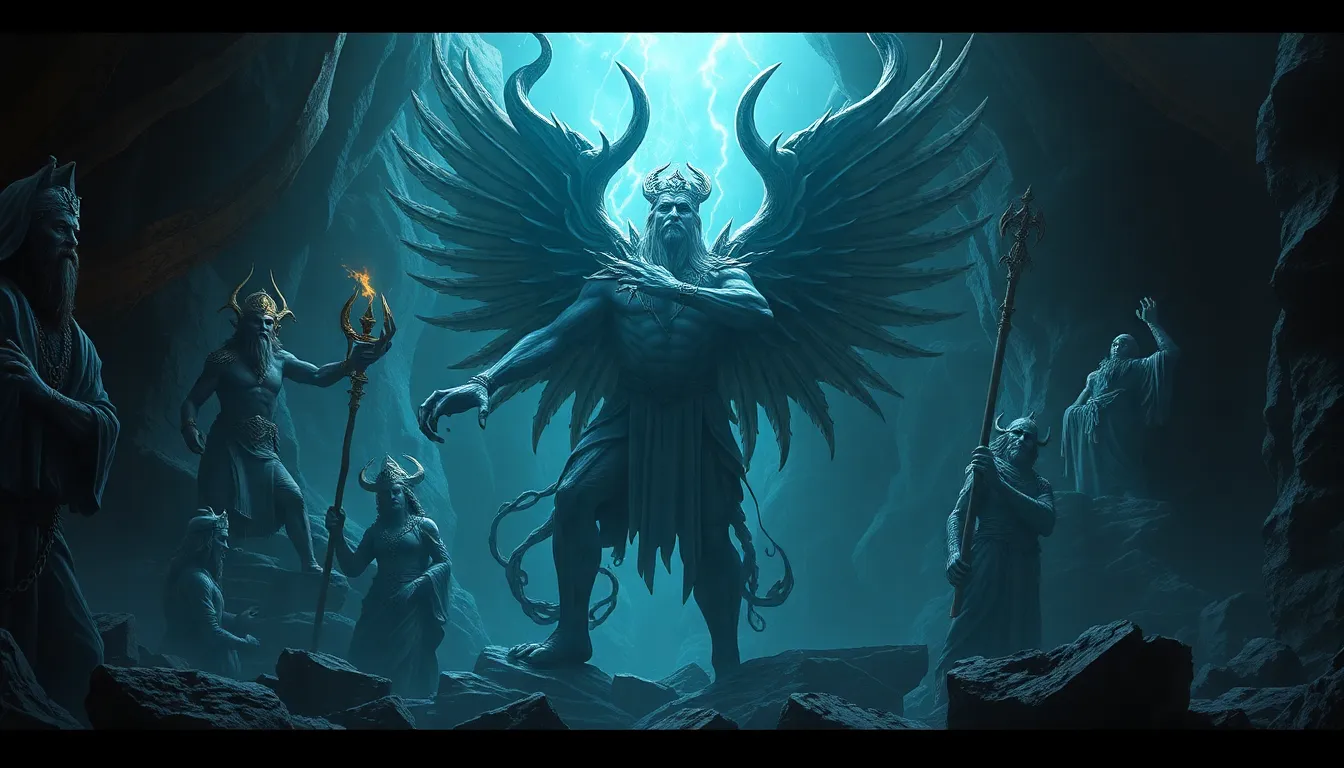Cursed by the Divine: The Most Shocking Punishments in Mythology
I. Introduction
The concept of divine punishment is a prevalent theme in mythologies across the globe, illustrating the consequences of human actions in relation to the divine. These myths serve as cautionary tales, warning individuals about the importance of moral conduct and the potential repercussions of defying divine authority.
Myths reflecting divine punishment are significant in that they provide insight into the cultural values and beliefs of various societies. They often reveal how different cultures perceive justice, morality, and the relationship between humanity and the divine. This article delves into the most shocking punishments depicted in various mythologies, examining case studies that highlight the moral lessons embedded in these age-old tales.
II. The Nature of Divine Punishments
Divine punishment can be defined as a consequence imposed by gods or goddesses on mortals for wrongdoing or transgressions against divine law. The characteristics of divine punishment often include:
- Severe consequences that reflect the gravity of the offense
- Public or personal humiliation
- Transformations or physical alterations
- Isolation or eternal suffering
The gods and goddesses in these myths play a crucial role in maintaining moral order. They not only enforce rules but also embody the principles of justice and righteousness. Common themes surrounding divine punishments include:
- Hubris: Excessive pride leading to downfall
- Deceit: Betrayal or trickery resulting in dire consequences
- Disobedience: Defiance against divine commands
III. Greek Mythology: The Wrath of the Olympians
Greek mythology is rich with tales of divine punishment, where the Olympian gods exact their wrath on mortals who transgress their laws. Notable punishments include the eternal torment of Prometheus, who stole fire from the gods, and the ceaseless toil of Sisyphus, condemned to roll a boulder uphill only for it to roll back down.
Case Study: Medusa – From Beauty to Monstrous Curse
Medusa, once a beautiful maiden, was transformed into a monster by Athena as punishment for being violated by Poseidon in her temple. This transformation came with the curse of turning anyone who looked at her into stone. Medusa’s story illustrates themes of victimization and the harshness of divine retribution, raising questions about justice and guilt.
The moral lessons conveyed through these stories often emphasize the importance of humility, respect for the gods, and the consequences of one’s actions, serving as a reminder of the delicate balance between mortals and the divine.
IV. Norse Mythology: The Fates of the Unworthy
Norse mythology is replete with tales of divine retribution, wherein the actions of gods and mortals alike bring about consequences that reflect their moral standings. The punishment of Loki, who betrayed the gods, highlights the severe repercussions of disloyalty.
Case Study: Loki’s Punishment and the Consequences of Betrayal
Loki’s treachery led to the death of Baldr, the beloved god, resulting in his capture and a gruesome punishment. He was bound with the entrails of his son and subjected to venom dripping on his face. This myth underscores the significance of loyalty, the consequences of deceit, and the complex nature of fate in Norse beliefs.
In Norse mythology, fate plays a pivotal role, suggesting that divine punishment is often intertwined with the inevitability of destiny, where actions lead to predetermined outcomes.
V. Egyptian Mythology: Judgments of the Afterlife
In Egyptian mythology, the concept of Ma’at represents truth, balance, and cosmic order, which governs the judgments of the afterlife. The dead are assessed based on their moral integrity, and divine punishments are often meted out based on this evaluation.
Case Study: The Fate of Set and Osiris – Punishments for Chaos and Murder
Set, the god of chaos, murdered his brother Osiris out of jealousy. In the afterlife, Osiris was resurrected, while Set faced punishment for his heinous act, representing the eternal struggle between order and chaos. This myth underscores the importance of moral integrity and the consequences of actions that disrupt the cosmic balance.
The significance of the afterlife in Egyptian mythology highlights the belief that divine justice is not limited to the earthly realm but extends beyond death, reinforcing the values of Ma’at in sustaining moral order.
VI. Hindu Mythology: Cosmic Balance and Retribution
Hindu mythology presents a nuanced view of divine justice through the concept of karma, where every action has repercussions that can affect one’s current life and future incarnations. This belief system emphasizes the cyclical nature of life and the importance of moral conduct.
Case Study: The Curse of King Yayati and the Implications of Desire
King Yayati, who desired to enjoy life despite his old age, was cursed to suffer the consequences of his greed. His story serves as a profound reminder of the dangers of unchecked desire and the inevitability of facing the repercussions of one’s actions, reinforcing the moral fabric of Hindu beliefs.
The cyclical nature of punishments and rewards in reincarnation underscores the belief that divine justice is both immediate and enduring, guiding individuals towards a path of righteousness.
VII. Mesopotamian Mythology: The Limits of Human Ambition
In Mesopotamian mythology, the divine council played a pivotal role in enacting punishments for human transgressions. The consequences often reflect the limits of human ambition and the need for humility before the divine.
Case Study: The Story of Gilgamesh and the Consequences of Hubris
Gilgamesh, a king who sought immortality, faced the wrath of the gods for his arrogance and excessive ambition. His journey ultimately led him to understand the limitations of human life and the acceptance of mortality. This story serves as a reflection on human nature, ambition, and the divine, emphasizing the importance of humility and respect for natural order.
VIII. Asian Mythologies: Varied Interpretations of Divine Retribution
Asian mythologies, particularly Chinese and Japanese, present diverse interpretations of divine punishment, weaving intricate tales that reflect the complexities of human and divine interactions.
Case Study: The Tale of Tamamo-no-Mae and the Consequences of Deceit
Tamamo-no-Mae, a beautiful woman who was actually a nine-tailed fox in disguise, deceived a powerful nobleman. Upon her exposure, she faced divine retribution, highlighting the themes of transformation and the consequences of deceit. This tale serves as a cultural insight into the relationship between humans and the divine in Asian societies, emphasizing the importance of truth and moral integrity.
IX. Conclusion
Divine punishments across various mythologies serve as powerful narratives that reflect the values, beliefs, and moral lessons of different cultures. From Greek tales of hubris to Hindu concepts of karma, these stories remind us of the consequences of our actions and the significance of maintaining a moral compass. Understanding these myths not only enriches our knowledge of cultural heritage but also offers timeless lessons that resonate with contemporary life.



